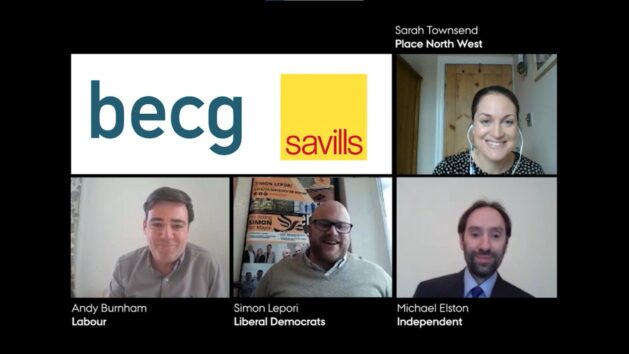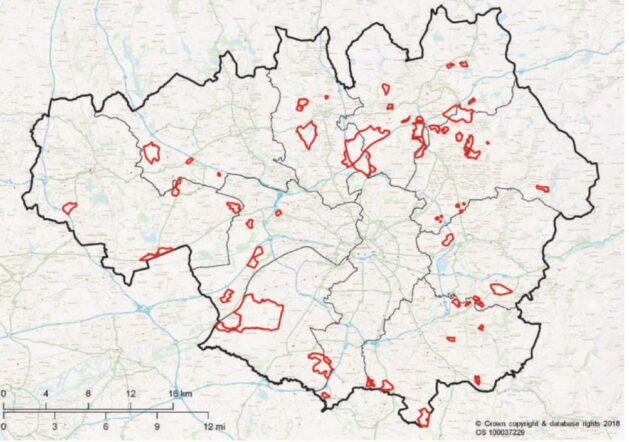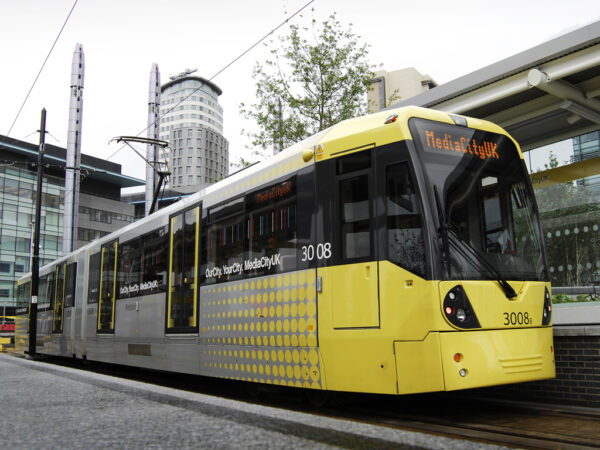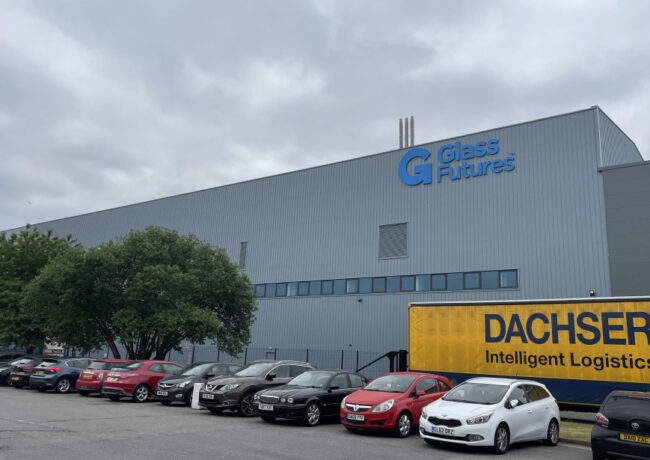Event Summary
Mayoral debate | Rebuilding the regions for all
With mayoral elections looming in May, candidates of various political stripes hope to break Labour’s hold over the Manchester and Liverpool city regions, but whether less experienced contenders can break the current monopolies remains to be seen.
At a Place North West event last week, candidates for the role of mayor in Greater Manchester and the Liverpool City Region outlined their plans for post-pandemic recovery, with a focus on transport, devolution and the low-carbon agenda.
 The free event was sponsored by BECG and Savills and hosted by Place North West editor Sarah Townsend.
The free event was sponsored by BECG and Savills and hosted by Place North West editor Sarah Townsend.
Given the nature of this event, we have decided to make access to the video recording free. View the video in full below.
Greater Manchester
Andy Burnham, Labour
Simon Lepori, Liberal Democrats
Michael Elston, Independent candidate
Introductions
Burnham expressed a desire to continue to break free from the “party-first approach” of Westminster and adopt a “place-first approach”.
“Westminster never gave us everything we needed and we are building something different,” he said. “If you can bring people together from different political backgrounds, you can create something more powerful.”
A key plank of Burnham’s campaign is his aim to implement a London-style integrated transport system across Greater Manchester. “It could take us from where we currently are to a different level as a world-class city region.”
Lepori, who took over from Andy Kelly as the Liberal Democrat candidate last year, said restoring faith in the police forice is one of the drivers behind his mayoral campaign.
Creating a transport system that “works for us rather than against us” and providing enough homes to reduce the number of people on housing waiting lists, are other issues he would like to tackle.
Elston’s campaign hinges on his desire to improve social and healthcare, in particular, certain approaches in NHS care homes and hospital wards that he said results in unnecessary deaths due to doctors being encouraged to “end patients’ lives prematurely by injecting them with morphine and depriving them of food and water”.
The GMSF, or ‘Places for Everyone’
Lepori said there had been a lack of consultation with the public in the early stages of the Greater Manchester Spatial Framework.
“There is a disconnect between what councils want and what communities want. We can call this NIMBYism or get back to basics and say people and communities weren’t included at the beginning of the process,” he said.
He added that more needs to be done to encourage the private sector to redevelop brownfield rather than greenfield land but conceded that the increased cost of remediating previously developed land puts some developers off.
Burnham blamed “parochial politicking” in Stockport for the delay in adoption of the GMSF and Stockport’s subsequent departure from the framework, but that ripping up the plan and allowing each of Greater Manchester’s 10 boroughs to form their own local plans instead would be “a major mistake”.
“Abandoning [the plan] at this point would leave Greater Manchester with no clear direction just when we need to be addressing recovery in a direct way post-pandemic,” he said.
Elston said he supported the creation of a joint plan but said it should work to link up communities and level up the economy within Greater Manchester. He also said many regeneration strategies had focussed on the city centre, rather than the outer boroughs and that this needs to change.
“Swathes of Greater Manchester have been neglected for as long as I can remember. The GMSF should not only allocate land for development but also think about how to integrate those developments into a cohesive Greater Manchester as a whole,” he said.
Climate change
Lepori said more efficient and effective handling of waste is one way that Greater Manchester could progress its meeting of carbon reduction targets.
“Moving to more recycling and less incineration and landfill is something that can aid the reduction in our carbon footprint,” he said. “We are still throwing away so much of our plastic because we lack the mechanisms and capacity to recycle.”
Elston said more needs to be done to encourage companies that manufacture sustainable building materials to move to Greater Manchester. “I want to bring these innovative manufacture industries here to Greater Manchester and incentivise them so we have products readily available. I want Greater Manchester to be ahead of the game in that regard.”
He added that “airships” could be used to transport the products around the country to further reduce carbon emissions by taking traffic off the roads.
Burnham said that to hit the 2038 net-zero carbon target, “every single property” in Greater Manchester would need to be retrofitted. “We need to make sure the climate thread is woven through every policy decision in Greater Manchester.”
Transport
Burnham is targeting the creation of a fully integrated bus and Metrolink network within the next three to five years. “At the moment, you have to be loyal to one mode [of transport] because as soon as you switch modes you pay again as though you are a new customer.
Greater Manchester’s current transport system needs to be vastly improved to make car-use less attractive, he concluded. “[My strategy] will take us from where we are to the next level. It is about applying Metrolink standards to the bus system,” he said.
Skills
Elston predicted that an unemployment problem is on the horizon and partnerships with education providers will be required to overcome it.
“I want to work with schools and colleges to broaden the curriculum so that trades are taught to people who aren’t as interested in academia. There are going to be innovative new trades needed but I want to encourage traditional trades like stone masonry, carpentry and metalwork.”
Burnham said the burgeoning retrofitting agenda could create “thousands of good jobs” in the future for those willing to train.
“We need a skills revolution,” he said. “I don’t believe in my lifetime that we have been in a position to say to the young people of Greater Manchester that if they train in a particular skill set, they could have a good quality job for life.”
Lepori agreed with Burnham, but said there needs to be a real commitment to creating “green apprenticeships” to create jobs and drive the carbon reduction agenda.
Liverpool City Region
Steve Rotheram, Labour
Jade Marsden, Conservatives
Gary Cargill, Green Party
Introductions
“My number one priority is to stand up for everybody in every part of our great city-region,” Rotheram said.
“Throughout the pandemic, I have done this. I have taken on [Prime Minister] Boris Johnson and the Government to win more funding and support for our councils.”
Rotheram added that, since being elected as metro mayor for the Liverpool City Region in 2017, he has secured £200m in extra funding for transport, skills and homelessness as well as creating 9,000 new jobs and 15,000 new homes.
“On 6 May, people have the opportunity to elect a metro mayor with a strong record of standing up for this area and winning funding from central Government. We need that to start to rebuild from Covid-19.”
Marsden said that people in the Liverpool City Region feel “let down and prevented from reaching their full potential” and said she would aim to give the public more power and control over their futures, if elected.
“We need to let people make their own decisions and give people the power to influence their own communities,” she said. “If people have control and power they are happier, the happier they are the more productive they are. When people are more productive, investment will follow.
“If you want to sell the region as a place where people will want to live, work and raise families, then vote for me. Let’s move forward as one, with the energy and enthusiasm to make our region competitive around the world.”
Cargill said his motivation for standing for mayor was the desire to create “a better world for his son”, who was born in 2018. His campaign hinges on his goal of making the city-region net-zero carbon by 2030, a decade earlier than the city region’s existing target.
“I became a dad and began to think about what the world might look like for my son when he is my age. It’s a bleak picture. We are just 20 years into this century and have had 19 of the hottest years on record. I believe that the next 10 years are the most important in the history of humankind.”
The mayoral model
Cargill claimed that Rotheram has not been visible enough during his three-and-a-half years in office.
“The true litmus test for the effectiveness of the mayoral model is to ask people what they think,” Cargill said. “I have asked people and the majority don’t know what the metro mayor does. The majority don’t even know who the metro mayor is.”
Rotheram countered that the foundations laid during his time in post could help to create a “fantastic city region for everybody” but bemoaned the lack of devolved powers he had been given, especially in terms of transport, education and employment.
“We have very limited powers and often have one arm tied behind our backs,” he said.
Housing
Marsden said building the right houses in the right places is key to creating communities and welcomed the city council’s decision to bring social housing back in house.
She added that new homes should be “sustainable and future-proofed” and feature elements aligned with the city region’s net-zero carbon targets, such as electric vehicle charging points.
“We need to start understanding what people want by getting people involved in the development process straight away,” she said.
Rotheram agreed that good quality housing is key to future achievement. “If you are born in a good home in a good area that gives you the chance of social mobility. If you are born in a poor house in a poor area, then that is detrimental to health and education and lasts a lifetime.”
Cargill said that, while the UK remains one of the wealthiest nations on the planet, nobody should live in “damp, cold or substandard housing” and cited the decline in the retail sector as an opportunity to provide more and better housing, using empty units in town centres.
“We need to rejuvenate our towns and cities. They are not the commercial hubs they once were. They can be more community focused with housing.”
Climate
Cargill painted a bleak picture with regard the city region’s climate change targets. “As a city region, we stand together on a dangerous precipice. The Liverpool City Region has a carbon budget that gives us 46m tonnes to expend by the year 2100. We are going to use up that budget in just seven years if we don’t act now.”
However, the fact that all six boroughs in the city-region have declared a climate emergency would allow the combined authority to “act fast” to speed up carbon reduction strategies, he added.
If elected, Cargill would bring the city region’s net-zero carbon target forward by a decade from 2040 to 2030 by retrofitting 47,500 homes a year for the next nine years, he pledged.
Rotheram said a net-zero carbon target of 2030 is unrealistic and retrofitting 47,500 homes a year would simply not be enough given that there are 700,000 homes in need of remediation across the city-region.
He added that bringing forward the net zero target would “inflict huge economic damage on the whole area”.
But Cargill was unmoved: “We are in crisis. For me, [a target of] 2040 is kicking the can down the road.”
However, pipeline schemes such as the Mersey Tidal Power project and Glass Futures in St Helens, could take “millions of tonnes” of CO2 out of the air, Rotheram added.
Brownfield first
“Rather than focusing on building executive homes on green spaces…we should be revitalising existing homes and upgrading empty buildings in our towns and cities,” Cargill said.
If elected, the Green Party candidate promised he would aim to make local communities part of the planning process and “empower them to identify brownfield sites for redevelopment rather than destroying and building on our valuable green spaces”.
Marsden agreed, saying that the city-region as a whole should adopt a brownfield-first approach to development in areas able to take advantage of existing infrastructure.
“We need to be building houses close to the city so that it is not a hardship to travel and we don’t have to be jumping in cars all the time,” she said.
Rotheram said developers would rather develop on virgin land as it eliminates uncertainty, but he agreed with Cargill that reducing VAT on brownfield developments could incentivise developers to take a brownfield-first approach.
Welfare
Both Cargill and Rotheram agreed that the implementation of a universal basic income would be a positive step forward for the city-region.
Cargill said it would “rebalance the system for those in need”, while Rotheram called on the Government to use the Liverpool City Region as a guinea pig for the initiative.











Steve Rotheram has done ok and has identified some key projects like Glass Futures in St Helens , but I would like to see major strides being made on public transport, with radical extensions and upgrades on the Merseyrail system, such as using the Edge Hill tunnels. In addition as the future looks to be controlling car access into cities, then a good quality, efficient tram network needs to be introduced with a first phase in the centre, and in time this can extend outwards, Bilbao is a good template, On the Wirral the current tram in Birkenhead should become a regular service and extended. Finally Steve Rotheram needs to make sure the cruise liner terminal building commences soon, as we already see a massive demand for cruising as the lockdown nears it`s end .
By Anonymous
Actually from the two city region mayors Rotheram has been quieter but has achieved more . From a start when he was hamstrung by a lack of preparation ( hostility from 1) from the city region local authorities he is now moving quickly with a stronger staff team . .He has the respect of the business community. A good foundation to move forward
By George
Disagree that tram is a need. Better Merseyrail with more and developed stations, and buses that run far more reliably and which could include tram-like buses, as used in Belfast. Tram is seriously expensive and Liverpool doesn’t have heavy rail lines, redundant and in-use, that could be adapted for tram use in the way that trams have developed in Manchester and Sheffield. Merseyrail uses that track and very well too. Play to existing strengths.
By Anonymous
Looking back at these hustings, Michael Elston, the independent, was very impressive. He correctly predicted the skills shortage, the increase in the cost of building supplies, the social care crisis, perhaps most startlingly he talked in his introduction about Operation Cygnus, which wasn’t so much as touched by The Telegraph until several months later (Perhaps even more astonishingly, Messrs Burnham and Rotheram didn’t offer, and as far as I’m aware, haven’t offered a response). He was evidently also correct about the airships!
By Iain